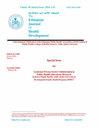Improvement of the Procedure for the Introduction of New Medical Technologies in Kazakhstan Based on the Extracorporeal Membrane Oxygenation
IF 0.4
4区 医学
Q4 PUBLIC, ENVIRONMENTAL & OCCUPATIONAL HEALTH
Ethiopian Journal of Health Development
Pub Date : 2021-01-01
DOI:10.32921/2225-9929-2021-1-41-48-53
引用次数: 0
Abstract
The process of introduction of new medical technologies in Kazakhstan is regulated by a number of normative and legal acts, and is aimed at allowing the use of drugs and medical devices that meet high standards of safety, quality and efficiency. This article examines the process of such introduction based on the extracorporeal membrane oxygenation technology, with an analysis of all stages of the process and recommendations for its improvement. Given the high efficiency of new medical technologies (on the example of extracorporeal membrane oxygenation), when their limited use is due to the lack of funds of a medical organization, the involvement of additional intellectual resources seems expedient. Key words: Health Technology Assessment, Extracorporeal Life Support, Extracorporeal Membrane Oxygenation, Health Service Assessment基于体外膜氧合的哈萨克斯坦医疗新技术引进程序的改进
在哈萨克斯坦,引进新医疗技术的进程受到若干规范性和法律法规的管制,其目的是允许使用符合安全、质量和效率高标准的药品和医疗设备。本文以体外膜氧合技术为基础,考察了体外膜氧合技术的引进过程,分析了过程的各个阶段,并提出了改进建议。鉴于新的医疗技术的高效率(以体外膜氧合为例),当由于医疗组织缺乏资金而限制其使用时,额外的智力资源的参与似乎是权宜之计。关键词:卫生技术评价,体外生命支持,体外膜氧合,卫生服务评价
本文章由计算机程序翻译,如有差异,请以英文原文为准。
求助全文
约1分钟内获得全文
求助全文
来源期刊

Ethiopian Journal of Health Development
PUBLIC, ENVIRONMENTAL & OCCUPATIONAL HEALTH-
CiteScore
0.80
自引率
0.00%
发文量
0
审稿时长
>12 weeks
期刊介绍:
The Ethiopian Journal of Health Development is a multi and interdisciplinary platform that provides space for public health experts in academics, policy and programs to share empirical evidence to contribute to health development agenda.
We publish original research articles, reviews, brief communications and commentaries on public health issues, to inform current research, policy and practice in all areas of common interest to the scholars in the field of public health, social sciences and humanities, health practitioners and policy makers. The journal publishes material relevant to any aspect of public health from a wide range of fields: epidemiology, environmental health, health economics, reproductive health, behavioral sciences, nutrition, psychiatry, social pharmacy, medical anthropology, medical sociology, clinical psychology and wide arrays of social sciences and humanities.
The journal publishes the following types of contribution:
1) Peer-reviewed original research articles and critical or analytical reviews in any area of social public health. These papers may be up to 3,500 words excluding abstract, tables, and references. Papers below this limit are preferred.
2) Peer-reviewed short reports of research findings on topical issues or published articles of between 2000 and 4000 words.
3) Brief communications, and commentaries debating on particular areas of focus, and published alongside, selected articles.
4) Special Issues bringing together collections of papers on a particular theme, and usually guest edited.
5) Editorial that flags critical issues of public health debate for policy, program and scientific consumption or further debate
 求助内容:
求助内容: 应助结果提醒方式:
应助结果提醒方式:


